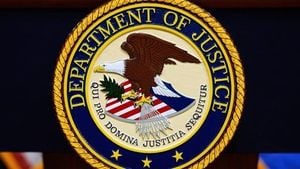On September 2, 2025, the political landscape in the United States shifted dramatically with two major announcements from the White House and state leadership, sending ripples through both the military establishment and urban communities. President Donald Trump, speaking from the Oval Office, declared that the U.S. Space Command headquarters would be moving from Colorado to Huntsville, Alabama—a reversal of a previous decision and a move with far-reaching implications for national defense and regional identity. Meanwhile, Illinois Governor JB Pritzker sounded an urgent alarm about the imminent deployment of federal agents and possibly even military personnel in Chicago, raising concerns about civil liberties and the federal government’s role in local law enforcement.
President Trump, flanked by Vice President JD Vance, Defense Secretary Pete Hegseth, and Alabama Senators Tommy Tuberville and Katie Britt, delivered his remarks with characteristic flourish. According to ABC News, he proclaimed, “Forever to be known from this point forward as Rocket City,” cementing Huntsville’s reputation as a center for aerospace and military innovation. The decision, made public in the Oval Office, reverses a 2023 move by then-President Joe Biden, who had selected Colorado Springs as the site for the new Space Command headquarters.
Trump, never one to shy away from political contrasts, took direct aim at Biden’s earlier choice. In his speech, he expressed hope that Space Command would remain in Alabama for “hundreds of years,” signaling a long-term commitment to the region and its role in America’s space and defense strategy. The presence of top officials, including Vice President Vance and Secretary Hegseth, underscored the administration’s unified front on this high-profile military relocation.
For Alabama, the announcement is more than just a bureaucratic reshuffling. Huntsville, already home to NASA’s Marshall Space Flight Center and a thriving aerospace sector, stands to benefit economically and culturally from the arrival of Space Command. The city’s new moniker, “Rocket City,” isn’t just a catchy phrase—it’s a nod to its deep roots in rocketry and defense, stretching back to the days of Wernher von Braun and the Saturn V program. The move is expected to bring jobs, federal investment, and renewed prestige to the area, making it a focal point for the nation’s space ambitions.
But the decision is not without controversy. The reversal of Biden’s 2023 order to base Space Command in Colorado Springs has raised eyebrows among military planners and local officials in Colorado, who had already begun preparations for the headquarters. The abrupt change, announced with little warning, has left some questioning the motivations behind the move and its potential impact on military readiness. Yet, for supporters in Alabama, it’s a long-overdue recognition of the state’s contributions to national defense.
As the news of Space Command’s relocation reverberated across the country, another, more urgent drama was unfolding in Illinois. Governor JB Pritzker, addressing reporters, laid out a stark warning about what he expects to see in Chicago in the coming days. Drawing parallels with recent events in Los Angeles and Washington, Pritzker said, “First, Donald Trump is positioning armed federal agents and staging military vehicles on federal property, such as the Great Lakes Naval base.”
According to Pritzker, federal agents from agencies including ICE, Customs and Border Patrol, and the Department of Homeland Security are being relocated from Los Angeles for deployment in Chicago. The governor voiced concerns that these agents are planning to “raid Latino communities and say they’re targeting violent criminals.” He didn’t mince words about the broader implications, warning that Trump “will be looking for any excuse to put active duty military on our streets, supposedly to protect ICE.”
Pritzker’s remarks, reported by ABC News, reflect a deep unease among local and state officials about the federal government’s expanding role in urban law enforcement. The governor stated, “We have reason to believe that the Trump administration has already begun staging the Texas National Guard for deployment in Illinois.” The prospect of military personnel patrolling Chicago’s streets has sparked debate about the balance between public safety and civil liberties, as well as the appropriate limits of federal intervention in local affairs.
The situation in Chicago is especially fraught given the city’s history of tense relations between law enforcement and communities of color. Pritzker’s warning that raids may target Latino neighborhoods under the guise of cracking down on violent crime has heightened fears of racial profiling and civil rights violations. Community leaders and advocacy groups are bracing for what could be a turbulent period, with the potential for protests and legal challenges if federal agents begin large-scale operations in the city.
Supporters of the Trump administration’s approach argue that federal intervention is necessary to combat rising crime and ensure the safety of residents. They point to recent spikes in violence in major cities and contend that local authorities have struggled to maintain order. For these advocates, the deployment of federal agents and, if necessary, military personnel, is a justified response to what they see as a crisis of public safety.
Opponents, however, see the move as an overreach that threatens the delicate balance between federal and local authority. They warn that the use of armed agents and military vehicles could escalate tensions and undermine trust in law enforcement, particularly in marginalized communities. The specter of the Texas National Guard being deployed in Illinois—something not seen in decades—adds another layer of complexity to an already volatile situation.
The convergence of these two stories—the relocation of Space Command to Alabama and the potential deployment of federal agents in Chicago—offers a snapshot of the nation’s current crossroads. On one hand, the federal government is making bold moves to reshape its military footprint and invest in strategic regions. On the other, it is asserting its presence in America’s cities in ways that raise fundamental questions about governance, civil rights, and the proper role of Washington in local affairs.
As the week unfolds, all eyes will be on Huntsville and Chicago. In Alabama, residents are preparing to embrace their new status as the heart of America’s space defense efforts. In Illinois, officials and citizens alike are bracing for a show of federal force that could redefine the relationship between the White House and the nation’s urban centers. The stakes, both symbolic and practical, could hardly be higher.
With these developments, the United States finds itself at a pivotal moment, navigating the challenges of national security, civil liberties, and the ever-shifting lines of authority between federal and local government. The decisions made this week will echo far beyond the headlines, shaping the country’s trajectory for years to come.




